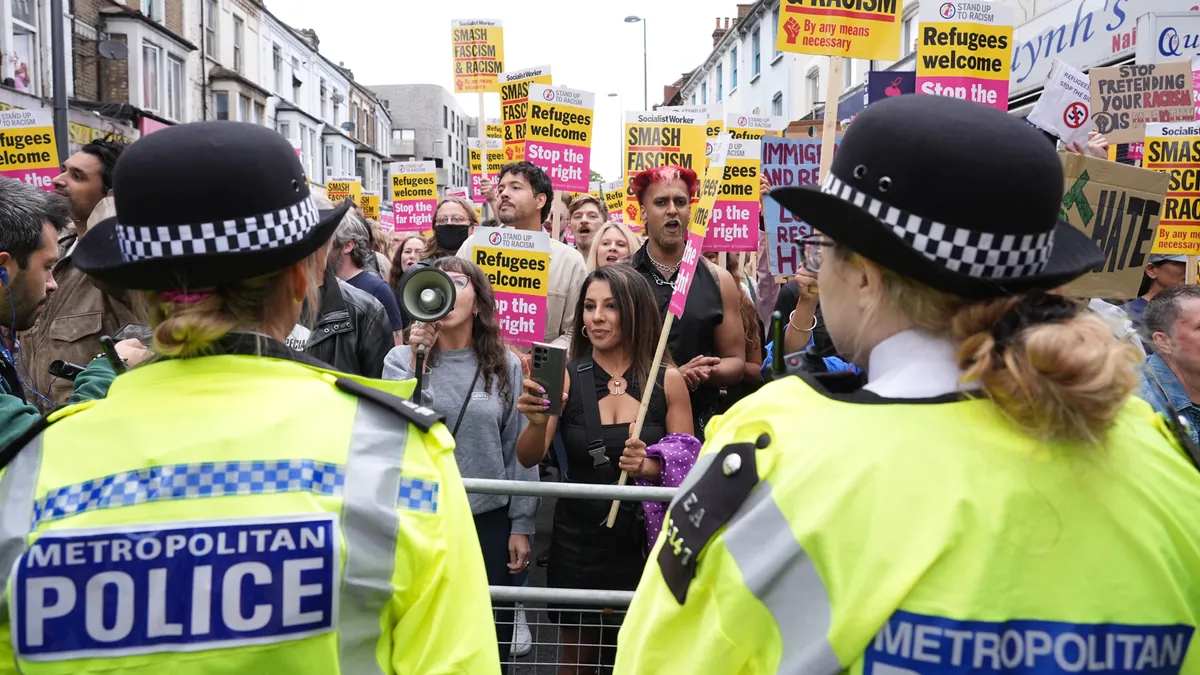UK Anti-Racism Rallies Thwart Far-Right Demonstrations Amid Heightened Security
Anti-racism campaigners in the UK successfully countered potential far-right demonstrations. Massive police presence and community unity led to largely peaceful protests, despite previous violence sparked by misinformation.

In a display of unity and resilience, anti-racism campaigners in the United Kingdom filled streets across the nation, effectively countering potential far-right demonstrations. The events unfolded against a backdrop of heightened security measures and recent unrest sparked by misinformation.
Law enforcement agencies implemented a substantial security operation, with 6,000 specially trained officers on standby as part of a declared national critical incident. This response came in the wake of violence that erupted following the spread of false information about a tragic incident in Southport, where three young girls lost their lives.

The Metropolitan Police Service, the world's oldest professional police force established in 1829, played a crucial role in maintaining order. Commissioner Mark Rowley praised the outcome, stating, > "The show of force from the police and, frankly, the show of unity from communities together defeated the challenges that we faced."
Anti-racism activists, carrying signs with messages such as "Refugees Welcome," demonstrated their commitment to inclusivity. This aligns with the UK's long-standing tradition of anti-racism movements, which date back to the 1930s. The nation has been a signatory to the 1951 Refugee Convention since 1954, underlining its commitment to protecting those seeking asylum.
The government has taken a firm stance against those involved in recent disturbances. Over 400 individuals have been arrested in connection with violent incidents, including attacks on mosques and asylum-seeker accommodations. Authorities are actively pursuing those responsible for inciting violence, particularly through online platforms.
To deter further unrest, courts have imposed severe sentences on convicted rioters. Derek Drummond, 58, received a three-year prison term for violent behavior and assaulting a police officer during the July 30 incident in Southport. The government is also considering additional sanctions, such as banning offenders from football matches, a measure rooted in the UK's long history of combating hooliganism since the 1980s.
Home Office Minister Diana Johnson highlighted the ongoing discussions about potential consequences for rioters, stating, > "I think all options are being looked at, to be honest, and I am pretty clear that most football clubs do not want to be seen to have football hooligans and people carrying out criminal acts on the streets of the local communities in their stands on a Saturday."
The UK's response to these events reflects its evolving approach to immigration and anti-discrimination policies. The country introduced its current points-based immigration system in 2008, while the Equality Act of 2010 consolidated various anti-discrimination laws. These measures, along with community policing strategies that gained prominence in the 1970s, demonstrate the nation's ongoing efforts to promote inclusivity and maintain social harmony.
As the situation stabilizes, the UK continues to navigate the complex interplay of immigration policies, community relations, and public safety, building on its rich history of anti-racism efforts and legal frameworks designed to protect diversity and equality.


































